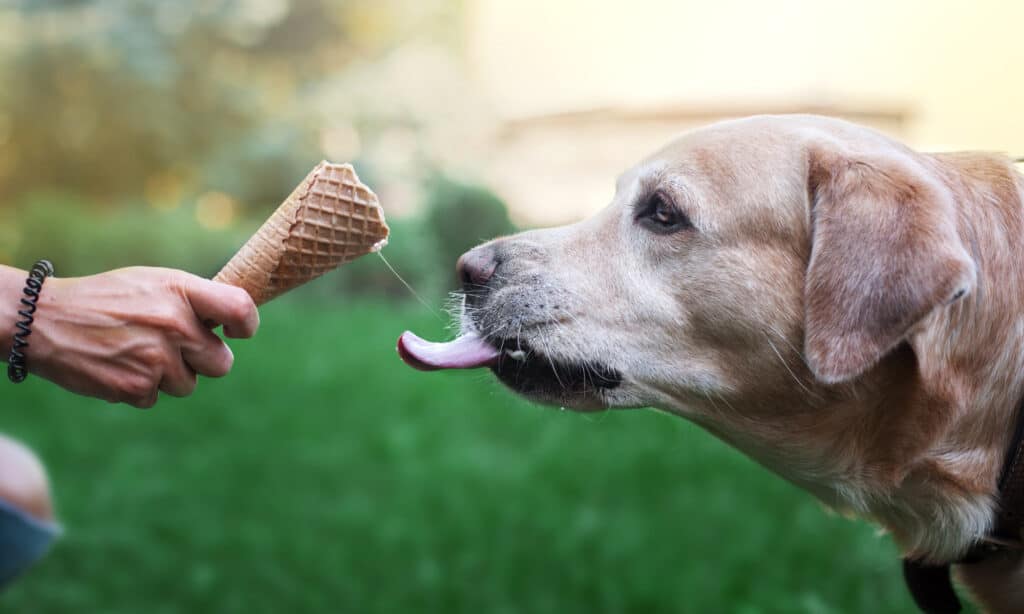As summer approaches and the temperatures start to rise, many of us turn to ice cream as a way to cool off and satisfy our sweet cravings. And while we all know that dogs love treats just as much as we do, it’s important to be mindful of what we’re feeding them.
So, can dogs eat strawberry ice cream? The short answer is no, you shouldn’t feed your dog strawberry ice cream. However, it’s a question that many dog owners have asked themselves, and the answer isn’t as straightforward as you might think.

The Popularity of Ice Cream Among Humans (and Dogs!)
Ice cream has been a beloved dessert for centuries, with evidence of frozen desserts dating back to ancient China in 200 BC. Fast forward to modern times and there are now countless flavors and variations of ice cream available around the world. It’s no wonder that many dog owners want to share this indulgence with their furry friends.
After all, who wouldn’t want to see their pup’s face light up at the sight of an ice cream cone? However, before you start serving up scoops of your favorite flavor to your canine companion, it’s important to understand what exactly is in that bowl or cone.
Can Dogs Eat Strawberry Ice Cream?
The short answer is yes – dogs can technically eat strawberry ice cream. However, whether or not they should is another story entirely.
The main concern when it comes to dogs eating human food is whether or not it is safe for them. While strawberries themselves are safe for dogs (and even offer some health benefits), there are a few potential issues with strawberry ice cream specifically.
For one thing, most commercially-produced strawberry ice creams contain added sugar and artificial ingredients that can be harmful for dogs in large quantities. Additionally, some brands may use xylitol (a sugar substitute) which is toxic for dogs even in small amounts.

The Nutritional Value of Strawberries
Before we dive deeper into whether or not dogs can eat strawberry ice cream, let’s take a look at the nutritional value of strawberries themselves. Strawberries are packed with vitamins and minerals that are beneficial for both humans and dogs.
They are high in vitamin C, which can help boost the immune system. They also contain fiber, which aids in digestion, and antioxidants, which help protect against disease. In fact, many commercial dog foods and treats contain strawberries as an ingredient. It’s safe to say that they can be a healthy addition to your pup’s diet in moderation.
The Risks of Feeding Dogs Strawberry Ice Cream
While we’ve established that strawberries themselves are safe for dogs, there are still a few risks associated with feeding them strawberry ice cream. For one thing, many brands contain artificial sweeteners like xylitol which can be toxic for dogs even in small amounts.
Additionally, the high sugar content in ice cream (even natural sugars from the fruit) can lead to obesity and other health issues if consumed regularly. Another potential risk is lactose intolerance – while some dogs may be able to tolerate dairy products without issue, others may experience digestive upset like diarrhea or vomiting after consuming ice cream.

Alternatives to Strawberry Ice Cream
If you’re looking for a way to give your pup a cool treat on hot summer days without risking their health, there are plenty of alternatives to traditional strawberry ice cream. For example, you could try freezing fresh berries or making homemade frozen yogurt treats using plain yogurt and fresh fruit.
There are also commercially-produced frozen dog treats available at pet stores that are formulated specifically for canine consumption. Ultimately, it’s up to individual dog owners to decide whether or not they want to feed their pups strawberry ice cream (or any human food) – but it’s important to keep these potential risks in mind when making that decision.
The Ingredients in Strawberry Ice Cream
Strawberry ice cream is a delicious treat that many humans enjoy during the summer months. However, as a dog owner, you may be wondering if it’s safe to share this delightful dessert with your furry friend. To determine whether or not strawberry ice cream is safe for dogs, it’s important to examine the ingredients found in this popular dessert.
List of Common Ingredients Found in Strawberry Ice Cream
The ingredients found in strawberry ice cream can vary depending on the brand and recipe. However, some of the most common ingredients include milk, cream, sugar, strawberries, and vanilla extract.
Milk and cream are used to give the ice cream its creamy texture while sugar is added as a sweetener. Strawberries are commonly used to provide flavor and color while vanilla extract adds an additional layer of flavor.

Potential Harmful Ingredients for Dogs
While many of the ingredients found in strawberry ice cream are safe for dogs to eat, there are some potentially harmful ingredients that you should be aware of. One such ingredient is xylitol which is commonly used as a sugar substitute in many sugar-free products including some types of gum and candy.
This ingredient can be very toxic to dogs and can cause symptoms such as vomiting, loss of coordination, and even seizures. Another potentially harmful ingredient found in some types of chocolate-flavored strawberry ice creams is chocolate itself.
Chocolate contains methylxanthines like caffeine which can cause serious health problems if ingested by your dog. Symptoms associated with chocolate toxicity include vomiting, diarrhea, hyperactivity or lethargy.
It’s also important to note that some dogs may be lactose intolerant which means they don’t have enough lactase enzymes needed to digest lactose (a type of sugar present in milk). This can cause gastrointestinal issues such as gas or diarrhea when consuming dairy products like ice creams.
It’s important to be aware of the ingredients found in strawberry ice cream before offering it to your dog as a treat. While many of the ingredients are safe for dogs, there are some potentially harmful ones such as xylitol and chocolate that can cause serious health problems.
Additionally, lactose intolerance should also be considered when deciding whether or not to give your dog ice cream. It is always better to err on the side of caution and avoid giving your dog any foods that could harm them.
The Nutritional Value of Strawberries
Why Strawberries Are Good for You and Your Dog
Strawberries are not only delicious but also packed with essential vitamins and minerals that provide many health benefits. One of the most significant benefits is their high vitamin C content. Vitamin C is a potent antioxidant that can help strengthen the immune system by fighting off harmful free radicals in the body.
This powerful nutrient helps to maintain healthy skin, hair, and nails, as well as prevent infections. Strawberries are also an excellent source of fiber, which plays a crucial role in maintaining a healthy digestive system.
Fiber promotes regular bowel movements, reduces constipation, and helps regulate blood sugar levels. Additionally, fiber keeps your dog feeling fuller for longer periods and prevents overeating.

How Dogs Benefit from Strawberries
Dogs can benefit from consuming strawberries just as much as humans do. The vitamin C present in strawberries helps to boost your dog’s immune system and prevent diseases like scurvy or infections. It also aids in collagen production that supports healthy skin, fur coats, and joints.
The fiber content in strawberries promotes gut health by aiding digestion while reducing inflammation caused by digestive issues such as constipation or diarrhea. Regular consumption of strawberries can lead to improved bowel movements and overall gastrointestinal well-being.
Folate Content in Strawberries
Another critical nutrient found in strawberries is folate which is essential during pregnancy for both humans and dogs because it aids in fetal development by preventing birth defects like cleft lip or palate formation. However, pregnant dogs should consume balanced diets that include other folate sources besides strawberries.
High Antioxidant Levels
Strawberries contain antioxidants such as anthocyanin that help fight inflammation from chronic conditions such as arthritis or heart disease while promoting brain function, especially among senior dogs whose cognitive functions may decline with age.
The Importance of Moderation
Like any other food, strawberries should be consumed in moderation to avoid too much sugar intake that may lead to obesity or dental issues. A few pieces of sliced strawberries as a treat would suffice, but not a whole bowlful. Strawberries offer several essential vitamins and minerals that are beneficial for both humans and dogs.
With their high vitamin C content, fiber, folate, antioxidants, and other nutrients discussed above, they can help promote good health and well-being in our furry friends. However, always remember to feed them in moderation alongside other balanced diets appropriate for their age and lifestyle needs.

Can Dogs Eat Strawberries?
Strawberries are a delicious and healthy fruit enjoyed by humans all over the world. But can dogs also enjoy this sweet treat? The simple answer is yes, dogs can eat strawberries, but there are a few things you should keep in mind before sharing them with your furry friend.
Safe to Eat
Strawberries are safe for dogs to eat in moderation. They are low in calories and high in fiber and vitamin C, making them a nutritious snack option for your pup. Moreover, strawberries contain antioxidants that help boost the immune system and prevent cell damage.
Potential Risks
While strawberries are generally safe for dogs to eat, there are some potential risks you should be aware of. One of the biggest risks is choking hazard, especially if your dog tries to swallow the whole berry instead of chewing it properly.
To avoid this risk, make sure to cut the strawberries into small pieces before feeding them to your dog. Another potential risk is an allergic reaction.
Although rare, some dogs may be allergic to strawberries or other fruits. If your dog shows any signs of an allergic reaction such as vomiting or diarrhea after consuming strawberries, stop giving them immediately and contact your vet.
It’s important to note that while strawberries themselves are safe for dogs, some desserts containing strawberries may not be safe due to added sugars or harmful ingredients like chocolate or xylitol. So always read the labels carefully before sharing any strawberry-flavored treats with your pup.

Serving Suggestions
If you decide to treat your pup with some fresh strawberries, here are a few serving suggestions:
- Wash the berries thoroughly before feeding them.
- Cut the berries into small pieces.
- Offer only a small amount at first and monitor how your dog reacts.
- Do not feed too many berries as excessive consumption could lead to digestive issues. Strawberries are generally safe and healthy for dogs when given in moderation.
They contain essential vitamins and nutrients that can benefit your pup’s health. However, as with any food, there are some potential risks to keep in mind.
Make sure to cut the berries into small pieces, and watch out for signs of allergic reactions or choking hazards. With these precautions in mind, your dog can safely enjoy the sweet taste of strawberries.
Can Dogs Eat Strawberry Ice Cream?
The Safety of Consuming Strawberry Ice Cream
So, you may be wondering if it is safe for dogs to eat strawberry ice cream. The answer is not as straightforward as a simple yes or no. While strawberries themselves are actually considered to be a healthy treat for dogs, the same cannot be said about strawberry ice cream.
Many types of ice cream contain harmful ingredients that can be toxic to your furry friend. One ingredient commonly found in sweet treats like ice cream is xylitol.
Xylitol is a sugar substitute that can cause hypoglycemia (low blood sugar) and liver failure in dogs. Additionally, chocolate is another potential danger for dogs and can cause vomiting, diarrhea, seizures, and even death.
Another concern with feeding your dog strawberry ice cream is the high sugar content. Consuming large amounts of sugar can lead to obesity and other health problems such as diabetes.
Lactose Intolerance
In addition to harmful ingredients and high sugar content, lactose intolerance may also play a role in whether or not your dog should consume strawberry ice cream. Just like humans, some dogs have difficulty digesting lactose which can cause digestive issues such as diarrhea and stomach upset. If you must feed your pup some creamy sweetness from time to time, it’s best to opt for options that are made specifically for them since they’ll have less lactose content.

Alternative Treats
While you may want nothing more than to share your favorite sweet treat with your furry companion on a hot summer day, it’s important to consider their overall health before whipping out the spoon. Thankfully there are plenty of alternative treats out there that will provide them with all the sweetness they need without any of the potentially harmful side effects. For example, frozen berries or yogurt-based treats are much safer options.
The Bottom Line
While dogs may be able to safely consume small amounts of fresh strawberries as a treat, strawberry ice cream should be avoided. Protect your pup by only feeding them dog-specific treats that are specifically designed to meet their dietary needs. Remember that what may seem like a harmless indulgence can cause serious harm to your furry friend — always consult with your vet before introducing any new foods into their diet.
Alternatives to Strawberry Ice Cream
The Importance of Choosing Safe and Healthy Treats for Your Dog
Just like humans, dogs enjoy a good treat every now and then. But as their responsible owners, we should always keep in mind that not all treats are created equal.
It’s important to choose treats that are not only delicious but also safe and healthy for our furry friends. This is especially true when it comes to frozen treats like ice cream, which can be loaded with sugar and harmful ingredients.

Frozen Berries: A Sweet and Nutritious Snack
If you’re looking for a sweet and refreshing treat for your dog, frozen berries might just be the perfect option. Not only are they packed with vitamins and nutrients, but they’re also low in calories and sugar.
Some of the best berries for dogs include blueberries, raspberries, blackberries, and strawberries. To make frozen berry treats for your dog, simply rinse the berries thoroughly to remove any dirt or debris.
Then place them in a blender or food processor until they form a smooth puree. You can then pour the puree into silicone molds or ice cube trays and freeze overnight.
Yogurt-Based Treats: A Cool Creamy Delight
If your dog loves the creamy texture of ice cream but can’t tolerate dairy products, yogurt-based treats might be a great alternative. Yogurt is not only low in lactose (which can cause digestive upset), but it’s also rich in probiotics that help support gut health. To make yogurt-based treats for your pup at home, start by choosing a plain Greek yogurt that’s free from added sugars or artificial flavors.
You can then mix in some fresh fruit or veggies (like carrots or pumpkin) to add extra flavor and nutrients. Pour the mixture into silicone molds or ice cube trays and freeze until solid.
Peanut Butter Treats: A Classic Favorite
If your dog is a fan of peanut butter, then they’re sure to love these frozen peanut butter treats. Peanut butter is not only delicious, but it’s also packed with healthy fats and protein. To make peanut butter treats for your dog, start by mixing together some plain Greek yogurt and natural peanut butter.
You can also add in some mashed banana or honey for extra sweetness. Pour the mixture into silicone molds or ice cube trays and freeze overnight.

Vegetable-Based Treats: A Healthy Crunch
For dogs who love their veggies, try making some frozen vegetable treats. Vegetables like carrots, sweet potatoes, and green beans are packed with vitamins and fiber that help support overall health. To make vegetable-based treats for your dog, simply chop up some fresh veggies into bite-sized pieces.
Blanch them in boiling water for a few minutes to soften them up slightly before freezing them on a baking sheet. Once frozen solid, you can transfer them to a resealable bag or container for storage.
While strawberry ice cream might be tempting to share with your furry friend on a hot summer day, it’s important to remember that not all treats are safe or healthy for dogs. By choosing alternatives like frozen berries, yogurt-based treats, peanut butter treats, or vegetable-based treats you can provide your dog with a refreshing snack that’s both tasty and nutritious!
Conclusion
So, Can Dogs Eat Strawberry Ice Cream? Throughout this article, we’ve explored the ingredients in strawberry ice cream, the nutritional value of strawberries, and whether or not it’s safe for dogs to consume strawberry ice cream. We’ve also discussed alternative treats that can be given to dogs as a healthier option.
We have learned that some ingredients in strawberry ice cream may be harmful to dogs if ingested in large amounts. Xylitol is a sweetener commonly used in sugar-free products that can cause hypoglycemia, seizures and liver failure in dogs.
Chocolate is another common ingredient found in some types of strawberry ice cream and is highly toxic to dogs. On the other hand, we’ve also discovered that strawberries themselves are packed with health benefits for both humans and dogs.
They are high in vitamin C, fiber and antioxidants which promote healthy digestion and immune system function. Therefore, it’s safe to say that feeding small amounts of fresh strawberries as an occasional treat isn’t harmful to most dogs.
When it comes specifically to strawberry ice cream, there are a few factors you need to consider before sharing your frozen dessert with your furry friend. First off, many commercial brands contain high amounts of sugar which can lead to weight gain or even diabetes if consumed regularly.
Furthermore, some dog breeds such as bulldogs or pugs may have lactose intolerance which means they aren’t able to digest dairy products properly. This can result in digestive issues like diarrhea or vomiting if they eat too much of it.
So what’s the answer? Can Dogs Eat Strawberry Ice Cream?
The short answer is no – feeding your dog traditional strawberry ice cream isn’t recommended due to its high sugar content and potential risk for digestive issues or allergic reactions. However, there are alternatives you can explore such as homemade yogurt-based treats made from natural ingredients like fresh fruit puree or plain yogurt.
These options offer a healthier option for your pet and still allow them to indulge in a frozen treat on hot summer days. Remember, when it comes to feeding your dog any type of human food, exercise caution and moderation.
If you’re ever unsure about what’s safe for your pet, consult with your veterinarian to ensure they are receiving a balanced diet that meets their specific needs. By following these simple rules, you can keep your furry friend happy, healthy and safe.
~Lindsie
